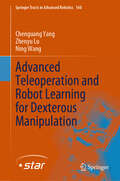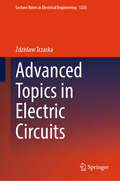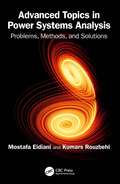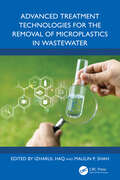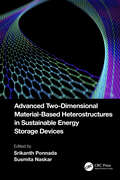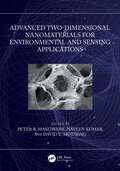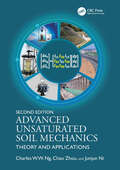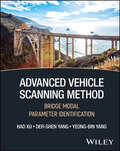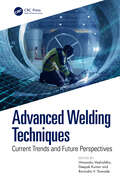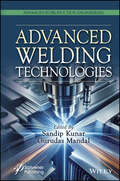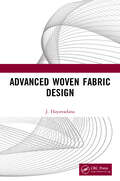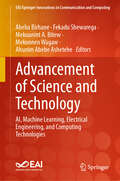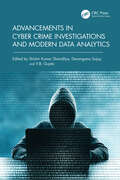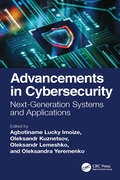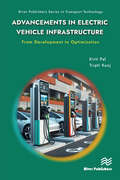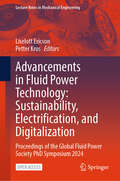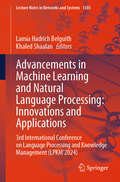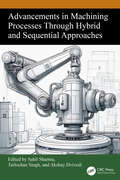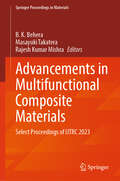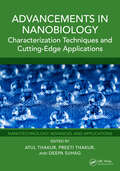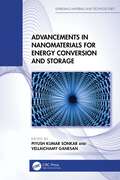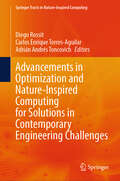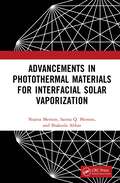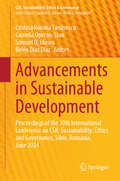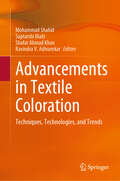- Table View
- List View
Advanced Teleoperation and Robot Learning for Dexterous Manipulation (Springer Tracts in Advanced Robotics #160)
by Chenguang Yang Ning Wang Zhenyu LuThis book offers an in-depth exploration of the interdisciplinary field of dexterous robotic manipulation, focusing on advanced methods that enable robots to autonomously learn, adapt, and perform a variety of tasks. It covers key topics such as teleoperation systems, advanced control frameworks, and bio-inspired autonomous learning. The book stands out by providing a comprehensive examination of both the technical and theoretical aspects of dexterous manipulation, with a particular emphasis on integrating advanced control and autonomous learning. The book is primarily aimed at researchers, engineers, and graduate students in the fields of robotics, artificial intelligence, and control systems. It is particularly useful for those interested in robotic manipulation, autonomous learning, and bio-inspired systems. The detailed technical explanations and cutting-edge research make it an essential resource for professionals seeking to push the boundaries of robotic dexterous manipulation. The book’s practical applications make it relevant for many real-world manipulation scenarios, including healthcare and manufacturing.
Advanced Topics in Electric Circuits (Lecture Notes in Electrical Engineering #1235)
by Zdzislaw TrzaskaThis book is addressed to researchers and practitioners in the theory and applications of electric circuits. It can also serve as a textbook for Ph.D. students examining applications of modern mathematics to important issues emerging nowadays more and more often in advanced electrical and electronic systems. The book offers effective tools to facilitate the study of all those circuits and systems increasingly penetrating our world, helping to discover their hidden beauty. The material is presented in twelve chapters divided into sections. Usually, first sections are of an introductory nature, explain studied phenomena and announce numerical results. More advanced investigations are presented in subsequent sections. The center of concern is set on existing modern methods as well as continuously emerging new methods of investigations useful for researchers, engineers and practitioners active in many interdisciplinary fields, where physics, electrochemistry, and electric circuits play a key role. Coverage includes: • Principles of optimal operations of electrical circuits; • The equilibrium state of the circuit as a stationary point of its power functional; • The Gibbs effect and its consequences for circuit analysis; • Accurate calculation of complex dynamic circuits operating in non-sinusoidal periodic states; • Energy hysteresis loops in non-sinusoidal periodic states of circuits; • Optimal transformations of elements in three-phase circuits; • Analog and digital filters; • Fractals and their structures and measures; • Fibonacci, Sierpiński and Cantor circuits; • Chaos in electrical circuits; •Electrochemical impedance spectroscopy; •Circuits with nanostructures and their properties; •Circuits of fractional orders; •AI in electrical circuits. This is the first extensive description of these topics and the interpretations of analytical results and those obtained from computer simulations with MATLAB environments. Special attention is paid to nonlinear electric circuits and finally the presentation is extended to effective applications of the achievements of modern AI. Numerous examples and exercises illustrate main results of the book. The book provides readers with a better understanding of origins and properties of many new circuit structures made possible by nanotechnology and atomic microscopy.
Advanced Topics in Power Systems Analysis: Problems, Methods, and Solutions
by Mostafa Eidiani Kumars RouzbehiElectric Power Systems Analysis is one of the most challenging courses in the Electric Power Engineering major which is taught to junior students. Its complexity arises from numerous prerequisites, a wide array of topics, and a crucial dependence on computational tools, presenting students with significant challenges.This book serves as a continuation of our previous book, Fundamentals of Power Systems Analysis 1: Problems and Solutions, specifically delving into advanced topics in power systems analysis.The structure of the Advanced Topics in Power Systems Analysisis as follows: Economic Load Dispatch, Symmetrical and Unsymmetrical Short Circuits, Transient Stability Analysis, Power System Linear Cintrols, and Key Concepts in Power System Analysis, Operation, and Control.The structure of the Fundamentals of Power System Analysis 1 is as follows: Introduction to the Power System, Transmission Line Parameters, Line Model and Performance, and Power Flow Analysis.In brief, advantages associated with delving into both books are as follows: A variety of tests to prepare for employment exams. Electrical engineers practicing power system analysis can find almost everything they need. This book contains both difficult and easy problems and solutions. Readers have the capability to solve problems presented in this book solely using a calculator, without dependence on computer-based software. This book provides power systems concepts through studying two-choice questions. In the end, we had a great time in writing this book, and we truly hope you enjoy reading it as much as we enjoyed creating it!
Advanced Treatment Technologies for the Removal of Microplastics in Wastewater
by Maulin P. Shah Izharul HaqMicroplastics have become a significant environmental concern due to their persistence, potential to accumulate in aquatic ecosystems, and ability to infiltrate the food chain. Given the limitations of conventional wastewater treatment processes, advanced treatment technologies are being developed to enhance microplastic removal and mitigate their environmental impact. Advanced Treatment Technologies for the Removal of Microplastics in Wastewater presents the pervasive issue of microplastic pollution in wastewater, examining its origins in everyday activities and industrial processes and its spread through aquatic ecosystems. This book provides a deep dive into advanced treatment technologies including physico-chemical and biological methods, highlighting both the progress and challenges in effectively removing microplastics from wastewater. It also addresses the potential health risks posed by microplastic exposure, discussing how these particles act as carriers for toxic substances and their suspected links to health issues in humans and wildlife. With cutting-edge research, practical insights, and a comprehensive overview, this book equips readers with the knowledge needed to understand and address the critical issue of microplastics in our water and wastewater systems. Provides updated occurrence and characteristics of microplastics in various industrial wastewaters Presents advanced wastewater treatment technologies for microplastics removal. Gives a detailed account of the toxic effects of microplastics on animals, plants, and humans Covers innovative approaches for the management of emerging toxic compounds in industrial wastewaters.
Advanced Two-Dimensional Material-Based Heterostructures in Sustainable Energy Storage Devices
by Susmita Naskar Srikanth PonnadaAdvanced Two-Dimensional Material-Based Heterostructures in Sustainable Energy Storage Devices provides a detailed overview of advances and challenges in the development of 2D materials for use in energy storage devices. It offers deep insight into the synthesis, characterization, and application of different 2D materials and their heterostructures in a variety of energy storage devices, focusing on new phenomena and enhanced electrochemistry.This book: Introduces 2D materials, synthesis methods, and characterization techniques Discusses application in a wide range of batteries and supercapacitors Offers perspectives on future investigations necessary to overcome existing challenges This comprehensive reference is written to guide researchers and engineers working to advance the technology of energy-efficient energy storage devices.
Advanced Two-Dimensional Nanomaterials for Environmental and Sensing Applications
by Naveen Kumar Peter R. Makgwane David E. MotaungAdvanced Two-Dimensional Nanomaterials for Environmental and Sensing Applications provides state-of-the-art progress developments in the design strategies of 2D-based nanomaterials. It covers specific focused applications in respective environmental challenges posed by pollutants such as chemical gases, bacterial and microbial, textile dyes, pharmaceutical antibiotics, agricultural pesticides, and toxic heavy metals in water and air contaminations. It elaborates the applications of 2D nanomaterials in the context of technologies such as sensing and detection to monitor pollutants, as well as photocatalysis and adsorption for the removal of pollutants.Features: Elaborates the applications of 2D nanomaterials in the context of sensing and detection to monitor pollutants, as well as photocatalysis and adsorption for the removal of pollutants. Focuses on environmental pollutants detection, removal or remediation, and monitoring device fabrications. Discusses materials of specific dimension (2D). Covers both water and air remediation. Includes photocatalytic degradations and antimicrobial disinfection. This book is aimed at graduate students and researchers in chemical and civil engineering, materials science, and nanomaterials.
Advanced Unsaturated Soil Mechanics: Theory and Applications
by Junjun Ni Charles W.W. Ng Chao ZhouUnsaturated soil is a three-phase material that is ubiquitous on the Earth’s surface and exhibits complex behaviour, which becomes more complex in response to the Earth’s changing climate and increasing engineering activities. This is because the former affects its moisture and temperature conditions significantly and the latter governs its stress state and suction condition. This book is designed to meet the increasing challenges of climate change and engineering activities by covering the mechanics and engineering of unsaturated soil in a logical manner. It comprises four major parts: Water retention and flow characteristics Shear strength and stiffness at various temperatures State-dependent elasto-plastic constitutive modelling Field monitoring and engineering applications This second edition uniquely covers fundamental topics on unsaturated soil that are not covered in other similar books, including: the state- dependency of soil- water retention behaviour and water permeability functions, such as dependence on engineering activities small strain stiffness considering the influence of wetting- drying cycles and recent suction history, such as that due to climate change suction effects on dilatancy and peak shear strength cyclic thermal effects on soil behaviour state- dependent elastoplastic constitutive modelling of monotonic and cyclic behaviour engineering applications such as the South-to-North Water Transfer Project; an earthen landfill cover system devoid of geomembrane in the Xiaping landfill, Shenzhen; and a 15-m-deep multi- propped excavation in Tianjin, China
Advanced Vehicle Scanning Method: Bridge Modal Parameter Identification
by Hao Xu Yeong-Bin Yang Der-Shen YangFramework for scanning modal parameters of bridges from vehicle responses utilizing the Vehicle Scanning Method (VSM) Advanced Vehicle Scanning Method: Bridge Modal Parameter Identification delivers a complete theoretical framework for scanning of the modal parameters (frequencies, damping ratios, and mode shapes) of bridges from vehicle responses. This book provides comprehensive coverage of the application of the Vehicle Scanning Method (VSM) for different types of bridges, which has the advantage of mobility, economy, and efficiency over the conventional, direct method. Most of the materials presented in each chapter have been published as technical papers in high-ranking international journals, which were subjected to critical reviews. The contents of the book have been arranged such that they are reflective of the progressive advancement of the VSM technique. Edited by a highly qualified team of authors including one of the original developers of the VSM technique, Advanced Vehicle Scanning Method includes information on: The theoretical basis for bridge frequency identification and scanning methods enhanced by software and hardware toolsThe damping formula for determining the bridge damping ratio from the spatial correlation of the front and rear wheels of a two-axle test vehicleThe methods for removing the damping distortion effect on bridge mode shape recovery with no prior knowledge of bridge damping ratiosThe theoretical basis of scanning frequencies, damping ratios, and mode shapes using VSM for various types of bridges, such as curved bridges and thin-walled girders Advanced Vehicle Scanning Method is an essential reference on the subject for researchers working on bridge dynamics, graduate students in programs of study related to vehicle-bridge interaction, and practicing bridge engineers.
Advanced Welding Techniques: Current Trends and Future Perspectives
by Deepak Kumar Himanshu Vashishtha Ravindra V TaiwadeTo meet weight, quality, and cost targets, it is essential to design, develop, and manufacture optimal, cost- effective welded structures that take into consideration material, process, and dimensioning procedures. For effective design, a weld designer must have a comprehensive grasp of welding basics, associated metallurgy, and fabrication and characterization processes. Advanced Welding Techniques highlights breakthroughs in advances in welding methods and provides readers with the ability to accurately identify the appropriate welding processes and optimal improvement methods for intended applications. It offers comprehensive guidance on welding design to ensure readers are equipped to provide solutions to any technical malfunctions they may encounter, including: Supplies essential stepwise knowledge on design for welding, starting with the fundamentals to the complex Covers role of filler metals and parameters on welding performance, emerging and advanced welding techniques, and advantages and limitations of various methods Discusses integration of additive manufacturing and welding Contains practical applications Considers challenges and future scope for further research as well as future challenges This book offers students, academics, researchers, scientists, engineers, and industry experts a comprehensive overview of the most recent breakthroughs in advanced welding methods and their applications to joining various metals and their alloys.
Advanced Welding Technologies (Advances in Production Engineering)
by Sandip Kunar Gurudas MandalAdvanced Welding Technologies serves as a vital resource that transforms the perception of welding from a mere skill-based practice to a cutting-edge industrial method, offering comprehensive insights into its fundamental processes, research advancements, and diverse applications across technological and biomedical domains. Welding has traditionally been considered more of a skill-based proficiency than a technological industrial method. The reliance on highly trained human operators, along with the high cost and low reproducibility of many welding processes, has contributed to this perception. Extensive research has now been conducted on the fundamentals of welding processes, and while it remains a complex, multidisciplinary subject, the basic concepts are well understood. Advanced Welding Technologies is a comprehensive collection of the processes and applications of advanced welding technologies, giving a basic understanding of each process, research advancements, and their applications in various technological and biomedical domains for improving machining accuracy and quality. This volume will extend the possibilities of research in various areas of advanced welding technologies with basic and hybrid approaches, making it an easy reference for students and researchers working in this critical field. Readers will find the book: Covers technologies for successful improvement in advanced processes and the application of advanced welding technologies; Serves as a valuable reference to students and researchers involved in working with advanced welding technologies; Discusses successful fabrication of multipurpose advanced welding technologies, sustainability of advanced welding technologies, materials and processes, applications of machine learning in advanced welding technologies, and future scopes and challenges of advanced welding technologies. Audience Engineers, welders, researchers, academics, and students involved in advanced welding technologies, manufacturing, and materials science.
Advanced Woven Fabric Design
by J. HayavadanaKeeping in mind the advancements in the field of science and technology within the context of weaving, this book discusses advanced woven fabric design. It details the structural aspects of woven fabric and expands upon the related weaving or loom equipment required to produce a specific fabric structure. The subject matter of this book includes: Treble clothes Weft pile fabrics Damask and brocade fabrics Gauze and leno Practical aspects of fabric analysis This book includes illustrative examples and worksheets, which enable the reader to gain first-hand practice of fabric designing.Print edition not for sale in South Asia (India, Sri Lanka, Nepal, Bangladesh, Pakistan or Bhutan)
Advancement of Science and Technology: AI, Machine Learning, Electrical Engineering, and Computing Technologies (EAI/Springer Innovations in Communication and Computing)
by Mekuanint A. Bitew Abeba Birhane Fekadu Shewarega Mekonnen Wagaw Ahunim Abebe AsheteheThis proceeding presents the papers from the 11th International Conference on Advancement of Science and Technology (ICAST 2023), which took place in Bahir Dar, Ethiopia, in November 2023. The papers present economic and technologic developments in modern societies related to important issues such digitization, energy transformation, impact on national economy, and its recent advancements. The papers are relevant to researchers, academics, and professionals.
Advancements in Cyber Crime Investigations and Modern Data Analytics
by Shishir Kumar Shandilya V. B. Gupta Devangana SujayThis book presents a fresh perspective on combating cyber crime, showcasing innovative solutions from experts across various fields. With the integration of artificial intelligence (AI), contemporary challenges are addressed with state-of-the-art strategies. The book discusses a wide range of timely issues within the domain of cyber crime and investigation, emphasizing AI-driven solutions and future multidisciplinary perspectives. As data becomes central to all digital interactions, it also becomes increasingly vulnerable, making it a prime target for adversaries. This comprehensive volume compiles technical approaches to counter, investigate, and manage these complex avenues of misconduct under the umbrella of "Cyber Crime".Key Topics: LLMs as a Solution for SARs Triaging Technical Capacities to Counter CSAM A Journey of Mobile Forensic Investigation Digital Forensics Solving Financial Crimes Deepfake-Driven Financial Crimes and Countermeasures This book offers a thorough examination of the current landscape of cyber crime, the capabilities available to combat it, and the advanced measures required to stay ahead. A detailed roadmap of digital forensics, the science of decrypting cyber crime, is a key highlight, alongside an exploration of the rising capabilities of AI. We extend our gratitude to all the contributors and hope this book answers many questions while igniting curiosity and providing a stimulating intellectual experience.
Advancements in Cybersecurity: Next-Generation Systems and Applications
by Agbotiname Lucky Imoize Oleksandr Kuznetsov Oleksandr Lemeshko Oleksandra YeremenkoThis book offers a comprehensive exploration of cutting-edge research and developments in the field of cybersecurity. It presents a curated collection of chapters that reflect the latest in empirical data approximation, malware recognition, information security technologies, and beyond.Advancements in Cybersecurity: Next-Generation Systems and Applications offers readers a broad perspective on the multifaceted challenges and solutions in contemporary cybersecurity through topics ranging from the application of blockchain technology in securing information systems, to the development of new cost functions for the iterative generation of cryptographic components. The book not only addresses technical aspects but also provides insights into the theoretical frameworks and practical applications that underpin the development of robust cybersecurity systems. It explores the optimization of algorithms for generating nonlinear substitutions, the application of machine learning models for security evaluation, and the implementation of deep learning techniques for detecting sophisticated cyber-attacks. Through its in-depth analysis and forward-looking perspectives, this book contributes significantly to advancing cybersecurity research and practice, paving the way for a safer digital future.This book is designed to serve as an essential resource for researchers, practitioners, policymakers, and engineers in the fields of ICT, next-generation computing and IT security, including cryptography, AI/ML/DL, cyber resilience, network security, threat modeling and risk assessment, digital forensics, secure software development, hardware security, and human-centric security.
Advancements in Electric Vehicle Infrastructure: A Comprehensive Guide to Optimizing EV Infrastructure
by Kirti Pal Tripti KunjIn Advancements in Electric Vehicle Infrastructure: From Development to Optimization, readers embark on an enlightening journey through the ever-evolving landscape of electric mobility. This comprehensive guide delves into the historical evolution of electric vehicle technology, providing invaluable insights into the unique challenges and opportunities in transitioning to electric mobility. From optimal location and management of EV charging stations to a comparative analysis of charger types and their impact on distribution networks, this book offers a detailed exploration of EV infrastructure optimization. With a keen focus on prospects, readers gain a deep understanding of policy considerations, consumer trends, global market dynamics, and emerging technologies shaping the future of electric mobility. Whether you're a researcher, policymaker, industry professional, or student, "Advancements in Electric Vehicle Infrastructure" is your indispensable companion for navigating the complexities of electric transportation and driving positive change towards a sustainable future.
Advancements in Fluid Power Technology: Proceedings of the Global Fluid Power Society PhD Symposium 2024 (Lecture Notes in Mechanical Engineering)
by Petter Krus Liselott EricsonThis open access book contains contributions from the Global Fluid Power Society (GFPS) PhD Symposium 2024. It reflects the collaborative efforts of researchers who are dedicated to pushing the boundaries of fluid power research. The GFPS PhD symposium, established in 2016 as a biannual event, is a platform for exchanging ideas and insights related to fluid power technology, among young researchers. It serves as a focal point for the exploration of various technical topics related to fluid power, including components, systems, and applications. Fluid power technology undergoes a rapid transformation towards electrification and digitalization, requiring innovation and new technical solutions across the industry, in response to societal requirements on different aspects of sustainability. The book covers a range of topics that align with the symposium's theme: Advancements in Fluid Power Technology: Sustainability, Electrification, and Digitalization. The content encompasses a wide spectrum of subjects, including fluid power applications, control and automation, energy efficiency, electrification, and environmental sustainability. The book can be a valuable reference for researchers and professionals interested in fluid power research and allied fields.
Advancements in Machine Learning and Natural Language Processing: 3rd International Conference on Language Processing and Knowledge Management (LPKM’2024) (Lecture Notes in Networks and Systems #1303)
by Khaled Shaalan Lamia Hadrich BelguithThis book discovers groundbreaking advancements in artificial intelligence with innovative solutions for real-world challenges. This book showcases state-of-the-art methodologies like deep learning and transfer learning to tackle sentiment analysis, fake news detection, and multi-dialectal named entity recognition, with a special focus on Arabic language technologies. Bridging the gap between research and practice, it highlights topics such as knowledge extraction, AI ethics, and the societal impacts of big data. Targeted at researchers, educators, and professionals, it serves as a vital guide for beginners and a comprehensive reference for experts seeking to stay ahead in the rapidly evolving field of AI.
Advancements in Machining Processes Through Hybrid and Sequential Approaches
by Akshay Dvivedi Tarlochan SinghAdvancements in Machining Processes Through Hybrid and Sequential Approaches is a multi-contributed book that details the most current research in machining techniques to manufacture complex structures in difficult-to-machine materials.This book begins with an introduction to advanced machining techniques and highlights their key areas of application. Subsequently, it explores in detail developments in the field, focusing on thermal, mechanical, and electrochemical energy-based hybrid and sequential approaches. It covers topics such as triplex energy-based hybrid machining processes, which include grinding-assisted electrochemical discharge machining and ultrasonic-assisted electrochemical discharge machining processes. It also delves into the sequential machining processes and the postprocessing of materials through advanced finishing techniques such as abrasive flow finishing, electropolishing, ultrasonic vibration assisted polishing, etc. With its focus on advanced machining techniques and their applications in mechanical, biomedical, automotive, and aerospace engineering, this book is sure to pique the interest of those seeking to expand their understanding and enhance their practice.This book is a must-read for professionals in the field of machining, offering a wealth of knowledge and insights that can inspire new approaches and solutions.
Advancements in Multifunctional Composite Materials: Select Proceedings of IJTRC 2023 (Springer Proceedings in Materials #59)
by Rajesh Kumar Mishra B. K. Behera Masayuki TakateraThis book presents select proceedings of the First Indo-Japan Textile Research Conference (IJTRC 2023) and provides a comprehensive exploration of the transformative field of multifunctional composites in materials engineering. The book covers a wide range of topics such as 3D woven composites, honeycomb composites, woven spacer composites, and textile structural composites. It showcases the remarkable potential of these materials in various industries ranging from automotive to aerospace and from building construction to marine. It also addresses important aspects such as textile waste management, electromagnetic passivity, and fire resistance. This book serves as a valuable resource for researchers, postgraduate students, and professionals interested in staying at the forefront of multifunctional composite materials.
Advancements in Nanobiology: Characterization Techniques and Cutting-Edge Applications (Nanotechnology Advances and Applications)
by Atul Thakur Preeti Thakur Deepa SuhagThis book presents the design, synthesis, characterization, and advanced applications of nanomaterials and nanodevices in biology and medicine. It begins with an introduction to nanobiology, providing readers with insights into the significance of this emerging field. The book covers methods for characterizing nanoparticles, including Fourier transform infrared spectroscopy (FTIR), scanning electron microscopy (SEM), transmission electron microscopy (TEM), atomic force microscopy (AFM), X-ray diffraction (XRD), and other spectroscopy techniques. It also explores the applications of nanoparticles in optical coherence tomography, biosensors, neuroscience, genetic engineering, and cell biology. It explores various applications of nanoparticles, including spectroscopy, Raman imaging, molecular nanodevices, bioimaging techniques, regenerative medicine, cancer research, bio-molecular analysis, nanofabrication, multi-modal imaging, and microfluidic platforms. Additionally, it addresses important considerations such as nanotoxicology and safety in nanobiology. The book concludes by discussing future perspectives and potential advancements in the field, making it a valuable resource for researchers, students, and professionals exploring the transformative impact of nanobiology on science and medicine.Key Features: Covers fundamental concepts and advanced applications of nanomaterials and nanodevices in the fields of biology and medicine Presents advanced nanoparticle characterization techniques, including FTIR, SEM, TEM, AFM, and XRD Examines various biological applications of nanoparticles in diagnostics, neurobiology, genetic engineering, regenerative medicine, and cancer research Emphasizes the role of nanoparticles in understanding biological processes at the molecular level and developing innovative solutions for biomedical applications Provides insights into the toxicity issues and mechanisms underlying the toxicity of nanoparticles
Advancements in Nanomaterials for Energy Conversion and Storage (Emerging Materials and Technologies)
by Piyush Kumar Sonkar Vellaichamy GanesanIn this book, readers will find an exhaustive examination of the latest advancements in nanomaterials, covering their synthesis, characterization, and utilization in energy storage and conversion. Additionally, the text delves into the diverse applications of these nanomaterials across various fields such as supercapacitors, fuel cells, biofuel cells, solar cells, batteries, and organic electronics. The discussion also encompasses the challenges faced, historical context, and future outlooks within this rapidly evolving domain.Features: Cutting-edge insights: Stays abreast of the latest breakthroughs in nanomaterial science, with a succinct review of advanced materials tailored for energy storage applications. Developmental journey: Traces the evolution of energy storage materials, from their inception to their current state of the art. Versatile applications: Explores the diverse applications of nanomaterials in energy storage, spanning supercapacitors, fuel cells, biofuel cells, solar cells, batteries, and beyond. Visual aids: Enhances readers' understanding, with key figures and tables spotlighting the intricate applications of various nanomaterials. Geared toward researchers and graduate students in chemical engineering, chemical sciences, nanomaterials, and energy engineering/conversion, this book serves as an indispensable resource for those seeking to push the boundaries of nanotechnology in the pursuit of sustainable energy solutions.
Advancements in Optimization and Nature-Inspired Computing for Solutions in Contemporary Engineering Challenges (Springer Tracts in Nature-Inspired Computing)
by Diego Rossit Carlos Enrique Torres-Aguilar Adrián Andrés ToncovichThis book brings together cutting-edge research, methodologies, and applications in the field of optimization and nature-inspired computing, providing a comprehensive overview of the latest advancements and their applications in addressing contemporary challenges in engineering. The book demonstrates diverse applications of mathematical modeling in various aspects of production, logistic, design, energy, materials, and other engineering areas. The book includes topics in optimization algorithms nature-inspired computing multi-objective optimization hybrid optimization techniques evolutionary algorithms swarm intelligence machine learning for optimization applications of optimization in engineering sustainable engineering solutions big data analytics for optimization metaheuristic approaches cloud computing in optimization cyber-physical systems decision support systems emerging trends in optimization.
Advancements in Photothermal Materials for Interfacial Solar Vaporization
by Najma Memon Saima Q. Memon Shakeela AbbasThis monograph aims to examine different types of photothermal materials, such as metallic, organic, and composites, that have been reported to generate localized heat at the air–water interface, leading to vapor production on the surface. It focusses on various factors, including photothermal efficiency, evaporation rate, and others, which influence vapor generation. By drawing useful conclusions, this book contributes to the development of cutting-edge interfacial solar vaporization systems for practical applications.Features: Presents exclusive material on interfacial solar evaporators and photothermal materials. Discusses effective photothermal material selection. Helps calculate commercial material usage expenses in the field of photothermal-based evaporation systems. Examines different types of photothermal materials, such as metallic, organic, and composites. Explores photothermal efficiency and evaporation. This book is intended for graduate students and researchers in energy, chemical engineering, and materials science.
Advancements in Sustainable Development: Proceedings of the 10th International Conference on CSR, Sustainability, Ethics and Governance, Sibiu, Romania, June 2024 (CSR, Sustainability, Ethics & Governance)
by Samuel O. Idowu Belén Díaz Díaz Camelia Oprean-Stan Cristina Roxana TănăsescuThis book gathers selected contributions from the 10th Annual Conference of the Global Corporate Governance Institute, held in Sibiu, Romania on June 12 - 14, 2024. Its chapters present the work of internationally respected scholars and experts, focusing on corporate social responsibility, sustainability, ethics, corporate governance, finance, and responsible investing. In this context, it highlights the latest research findings on responsible action and their practical implications for business, society, science, and politics. The book pursues an integrated and multidisciplinary approach and equips readers with the knowledge they require for implementing holistic and effective sustainability strategies in organizations and educational institutions. Accordingly, it offers a valuable resource for academics, policymakers, business leaders, and sustainability practitioners who want to drive meaningful change for a sustainable future.
Advancements in Textile Coloration: Techniques, Technologies, and Trends
by Mohammad Shahid Shafat Ahmad Khan Ravindra V. Adivarekar Saptarshi MaitiThe book highlights the latest innovations in sustainable textile dyeing and printing, addressing the industry's growing need for eco-friendly solutions. This comprehensive book covers many topics, including waterless dyeing, air and dope dyeing technologies, electrochemical dyeing, and bio-based mordants and colorants. It also delves into microbial dyes, statistical approaches for optimizing coloration, and advanced surface modification techniques. Additionally, the book examines the evolution of textile printing from conventional to digital methods and discusses strategies for mitigating textile effluent pollution. With a strong emphasis on sustainability, this resource is invaluable for researchers, industry professionals, and academicians committed to advancing responsible textile coloration practices.
